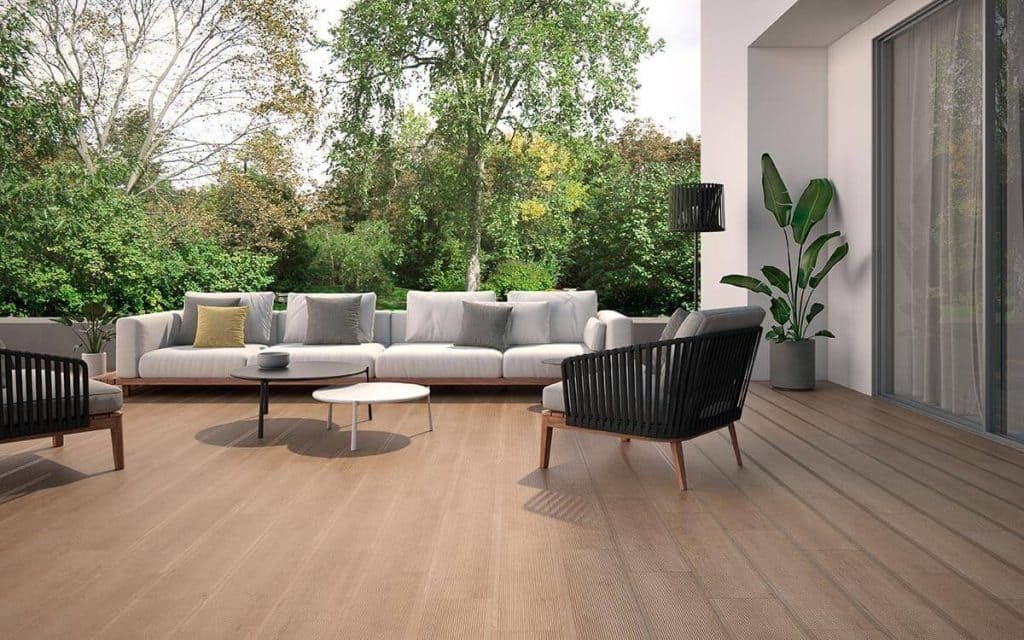Introduction
When it comes to designing a beautiful outdoor space, the terrace floor plays a pivotal role. A well-chosen terrace floor not only enhances the aesthetic appeal of your terrace but also provides a durable surface that can withstand the elements. With a variety of materials available, it can be challenging to choose the right one for your needs. In this article, we will explore the top five materials for a stunning terrace floor, discussing their pros and cons to help you make an informed decision.
1. Ceramic Tiles
Ceramic tiles are a popular choice for terrace floors due to their versatility and variety in design.
Pros:
- Durability: Ceramic tiles are resistant to wear and tear, making them a long-lasting option.
- Easy Maintenance: They are easy to clean and require minimal maintenance.
- Variety: Available in a wide range of colors, patterns, and textures.
Cons:
- Slipperiness: Some ceramic tiles can be slippery when wet.
- Temperature Sensitivity: They can become hot under direct sunlight.
2. Wood Decking
Wood decking adds a warm, natural look to your terrace floor, making it a favorite among homeowners.
Pros:
- Aesthetic Appeal: Provides a classic and elegant appearance.
- Comfort: Feels warm and comfortable underfoot.
- Eco-Friendly Options: Sustainable wood choices are available.
Cons:
- Maintenance: Requires regular sealing and staining to maintain its appearance.
- Susceptibility to Weather: Can warp, crack, or fade over time if not properly maintained.
3. Composite Decking
Composite decking combines wood fibers and plastic, offering the best of both worlds.
Pros:
- Durability: Resistant to rot, insects, and fading, ensuring longevity.
- Low Maintenance: Requires minimal upkeep compared to natural wood.
- Variety of Designs: Available in various colors and styles.
Cons:
- Cost: Higher initial investment compared to traditional wood.
- Heat Retention: Can get hot in direct sunlight.
4. Natural Stone
Natural stone, such as granite, slate, or limestone, is an exquisite choice for a terrace floor, adding a touch of luxury.
Pros:
- Unique Look: Each stone slab is unique, adding character to your terrace.
- Durability: Highly resistant to weather and wear.
- Value Addition: Increases the overall value of your property.
Cons:
- Cost: Typically more expensive than other materials.
- Installation Complexity: Requires professional installation due to weight and cutting needs.
5. Concrete
Concrete is a versatile and durable option that can be customized to fit any design style.
Pros:
- Strength: Extremely durable and can withstand heavy foot traffic.
- Customizable: Can be stamped, stained, or painted for a unique look.
- Cost-Effective: Generally more affordable than other materials.
Cons:
- Cracking: Can crack over time if not properly installed.
- Cold Feel: May feel cold underfoot, especially in cooler climates.
Summary Table of Pros and Cons
| Material | Pros | Cons |
|---|---|---|
| Ceramic Tiles | Durable, easy maintenance, variety | Slippery, temperature sensitive |
| Wood Decking | Aesthetic appeal, comfort, eco-friendly options | Maintenance, susceptibility to weather |
| Composite Decking | Durable, low maintenance, variety of designs | Cost, heat retention |
| Natural Stone | Unique look, durability, value addition | Cost, installation complexity |
| Concrete | Strength, customizable, cost-effective | Cracking, cold feel |
Conclusion
Choosing the right material for your terrace floor is essential for creating a stunning and functional outdoor space. Each material has its unique advantages and disadvantages, making it crucial to consider your specific needs, budget, and style preferences. Whether you opt for the elegance of natural stone, the warmth of wood, or the versatility of ceramic tiles, you can create a beautiful terrace floor that enhances your outdoor living experience. With the right choice, your terrace floor can become a beautiful extension of your home, perfect for relaxation and entertaining.
Questions and Answers (Q&N)
- What is the best material for a terrace floor?
- The best material depends on personal preference, climate, and maintenance considerations.
- Are ceramic tiles slippery?
- Some ceramic tiles can be slippery when wet, so choosing textured options can help mitigate this risk.
- How can I maintain my wood terrace floor?
- Regular sealing and staining are necessary to maintain the appearance and longevity of wood decking.
- Is natural stone worth the investment?
- While natural stone can be expensive, its durability and unique aesthetic can add significant value to your property.
- Can concrete be customized?
- Yes, concrete can be stamped, stained, or painted to achieve a variety of looks.


